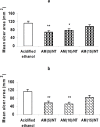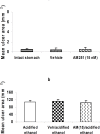Cannabinoid CB1 Receptors Mediate the Gastroprotective Effect of Neurotensin
- PMID: 23492756
- PMCID: PMC3586888
Cannabinoid CB1 Receptors Mediate the Gastroprotective Effect of Neurotensin
Abstract
Objectives: Several lines of evidence indicate that neuropeptides exhibit protective properties against gastroduodenal ulcers. Neurotensin, a gut-brain neuropeptide, is implicated in a number of physiological processes in the central nervous system and peripheral tissues including gastrointestinal tract. In the present study, we aimed to investigate the gastroprotective potential of either peripherally or centrally administered neurotensin with a look at the role of the cannabinoid CB1 receptors which are located in brain areas implicated in the regulation of gastric functions.
Materials and methods: Gastric mucosal damage was induced by intragastric administration of acidified ethanol in male Wistar rats. One hour later, gastric lesions were evaluated macroscopically. In gastroprotection study, neurotensin was administered either intravenously (1.5, 3, and 5 µM/kg) or intracerebroventricularly (0.5, 1, and 2.5 nM/rat) 30 min before the ethanol challenge. In order to evaluate the involvement of central CB1 receptors in the gastroprotective effect of neurotensin, the CB1 receptor antagonist AM251 (5, 10, and 15 nM/rat) was given i.c.v. 30 min prior to the administration of neurotensin. The effects of AM251 on the intact stomach and ethanol-induced gastric lesions were also evaluated.
Results: Acidified ethanol induced large areas of gastric lesions which were significantly reduced by the highest dose of neurotensin in i.v. or i.c.v. application. The gastroprotective effect of neurotensin was prevented by pretreatment with 15 nM/rat AM251. AM251 had no effect by itself.
Conclusion: Peripherally or centrally given neurotensin protects gastric mucosa against damage induced by acidified ethanol through the activation of central cannabinoid CB1 receptors.
Keywords: CB1 receptors; Gastroprotective action; Neurotensin.
Figures




Similar articles
-
Analysis of the effect of neuropeptides and cannabinoids in gastric mucosal defense initiated centrally in the rat.J Physiol Pharmacol. 2009 Dec;60 Suppl 7:93-100. J Physiol Pharmacol. 2009. PMID: 20388951
-
Central leptin and cholecystokinin in gastroprotection against ethanol-induced damage.Digestion. 2000;62(2-3):126-42. doi: 10.1159/000007805. Digestion. 2000. PMID: 11025360
-
Angiotensin II-induced activation of central AT1 receptors exerts endocannabinoid-mediated gastroprotective effect in rats.Mol Cell Endocrinol. 2014 Feb 15;382(2):971-8. doi: 10.1016/j.mce.2013.10.002. Epub 2013 Oct 18. Mol Cell Endocrinol. 2014. PMID: 24145131
-
Gastric mucosal protection: from the periphery to the central nervous system.J Physiol Pharmacol. 2015 Jun;66(3):319-29. J Physiol Pharmacol. 2015. PMID: 26084214 Review.
-
Mechanisms of esophageal protection, gastroprotection and ulcer healing by melatonin. implications for the therapeutic use of melatonin in gastroesophageal reflux disease (GERD) and peptic ulcer disease.Curr Pharm Des. 2014;20(30):4807-15. doi: 10.2174/1381612819666131119110258. Curr Pharm Des. 2014. PMID: 24251671 Review.
Cited by
-
The endocannabinoid system and NGF are involved in the mechanism of action of resveratrol: a multi-target nutraceutical with therapeutic potential in neuropsychiatric disorders.Psychopharmacology (Berl). 2016 Mar;233(6):1087-96. doi: 10.1007/s00213-015-4188-3. Epub 2016 Jan 18. Psychopharmacology (Berl). 2016. PMID: 26780936
-
Implication of NGF and endocannabinoid signaling in the mechanism of action of sesamol: a multi-target natural compound with therapeutic potential.Psychopharmacology (Berl). 2013 Oct;229(4):571-8. doi: 10.1007/s00213-013-3111-z. Epub 2013 Apr 27. Psychopharmacology (Berl). 2013. PMID: 23624775
-
CB1 cannabinoid receptors are involved in neuroleptic-induced enhancement of brain neurotensin.Iran J Basic Med Sci. 2014 Mar;17(3):181-8. Iran J Basic Med Sci. 2014. PMID: 24847420 Free PMC article.
References
-
- Yacyshyn BR, Thomson AB. Critical review of acid suppression in nonvariceal, acute, upper gastrointestinal bleeding. Dig Dis. 2000;18:117–128. - PubMed
-
- Conrad SA. Acute upper gastrointestinal bleeding in critically ill patients: causes and treatment modalities. Crit Care Med. 2002;30:S365–S368. - PubMed
-
- Faisy C, Guerot E, Diehl JL, Iftimovici E, Fagon JY. Clinically significant gastrointestinal bleeding in critically ill patients with and without stress-ulcer prophylaxis. Intensive Care Med. 2003;29:1306–1313. - PubMed
-
- Yacyshyn BR, Thomson AB. Critical review of acid suppression in nonvariceal, acute, uppergastrointestinal bleeding. Dig Dis. 2000;18:117–128. - PubMed
LinkOut - more resources
Full Text Sources
